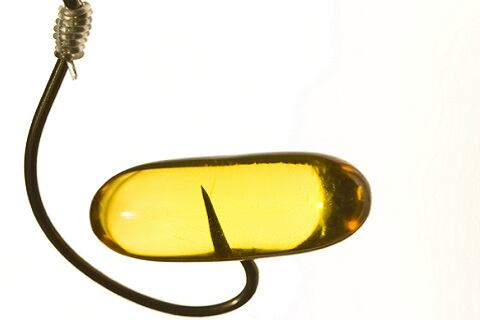On the other hand, significant risk reductions were observed for people with no history of hypertension, and ‘meaningful’ decreases were also seen in people with no history of CVD, report investigators of the AREDS2 Research Group.
“There was a numerical but not statistically significant difference toward heterogeneity in effects in the participants receiving omega-3 fatty acids, with those having no history of CVD or at low risk for development of the disease (no CVD, no hypertension, no elevated cholesterol level) showing potential benefit and those with a history of CVD or at higher risk of CVD showing no effect,” they wrote.
“However, the number of events for these subgroups was small, the confidence interval was wide, and the lack of isolated, individual risk factors may not provide a complete picture of an individual’s total cardiovascular risk.”
Leading supplement experts have questioned the cut-off levels in the study to show statistical significance, with the ‘meaningful’ but non-statistically significant results for omega-3s still having potentially important clinical benefits, despite the overall null results.
‘A failure to detect an effect’
Harry Rice, PhD, VP of regulatory & scientific affairs at the Global Organization for EPA and DHA Omega-3s (GOED), told NutraIngredients-USA: “Given that this ancillary study was under-powered, the results are not surprising and should not be misinterpreted as a lack of an effect(s), rather a failure to detect an effect. Prespecified subgroup analyses revealed some interesting protective effects - significant among individuals without a history of hypertension, as well as a trend among those without a history of cardiovascular disease.”
Duffy MacKay, ND, Sr VP of scientific & regulatory affairs for the Council for Responsible Nutrition (CRN), told us that the study was set up so that a positive result – ie. statistically significant – was associated with a 25% reduction in CVD events. “A 25% risk reduction to obtain a positive study is huge. These are drug-like numbers,” he added.
Despite the headline conclusion of the paper, “we did see great results in here”, he said.
Indeed, there was a statistically significant 34% reduction in risk of CVD in people with no history of hypertension, and a non-significant 19% reduction for people with no history of CVD. “That may not be statistically significant but it is still meaningful,” said Dr MacKay. “In these pre-defined sub-populations we see real demonstrable benefits.”
Study details

The AREDS2 study randomized 4,203 primarily white, married and highly educated people with a median age of 74 to one of four groups: One group receive supplements containing EPA and DHA (650 mg and 350 mg per day, respectively); the second group received lutein and zeaxanthin (10 mg and 2 mg per day, respectively); the third group received omega-3 plus the carotenoids; and the final group received a placebo. These interventions were all in addition to the AREDS vitamin and mineral formulation for macular degeneration.
Results showed that, overall, no statistically significant reductions were observed for the omega-3 supplements, lutein and zeaxathin supplements, or a combination of these, compared to placebo.
However, sub-group analysis did indicate significant benefits for select sub-groups.
The omega-3 and lutein and zeaxathin supplements were all very well tolerated, said the researchers, with no adverse effects reported.
Picking up on the adverse effects, CRN’s Dr MacKay noted that this could have an impact on compliance and ultimate benefits for any intervention. “In a drug study, if you get an effect size of 26% but a whole bunch of side effects then people will not take it so you effectively have zero effect. A product like omega-3 with a risk reduction of 10-15% and zero side effects could have an immense impact when translated to the population.”
Limitations… but fish are better…
In an accompanying editorial by Evangelos Rizos, MD, PhD, and Evangelia Ntzani, MD, PhD, from the University Hospital of Ioannina and the University of Ioannina School of Medicine in Greece, said that the 25% clinical benefit measure for statistical significance was substantial, and that 10-15% would have “more prudent and realistic” for cardiovascular events. .
They also noted that, “although the outcome adjudication was blinded, the open-label design of the study should be also acknowledged. Furthermore, there is a lack of information on the baseline and follow-up [triglyceride] levels, and a potentially varying omega-3 effect in high compared with low TG level subgroups had not been studied.”
They also noted the mixture of participants at high and low risk of cardiovascular disease – indeed, 20% of the subjects already had established CVD.
“After many years of randomized evidence accumulated on various outcomes across a variety of diseases, omega-3 supplementation still fails to find its place in everyday clinical practice,” they added.
“Until [future trials fill in the gaps in our knowledge], omega-3 should be considered only as [triglyceride]-lowering agents for those with severe hypertriglyceridemia (an extreme minority of the general population). Patients raising the question of taking omega-3 supplements should be informed of the uncertainty surrounding their choice, and regular dietary consumption of (whole) fish should be preferentially encouraged as a source of omega-3 (not supplements) based on the wealth of the available epidemiological evidence.”
Source: JAMA Internal Medicine
2014, Volume 174, Number 5, doi:10.1001/jamainternmed.2014.328
“Effect of Long-Chain [omega]-3 Fatty Acids and Lutein + Zeaxanthin Supplements on Cardiovascular Outcomes: Results of the Age-Related Eye Disease Study 2 (AREDS2) Randomized Clinical Trial”
Author: The writing group for the Age-Related Eye Disease Study 2 (AREDS2) clinical trial.
Editorial: JAMA Internal Medicine
2014, Volume 174, Number 5, doi:10.1001/jamainternmed.2013.13734
“[Omega]-3 Fatty Acids and Lutein + Zeaxanthin Supplementation for the Prevention of Cardiovascular Disease”
Authors: E.C. Rizos, E.E. Ntzani
